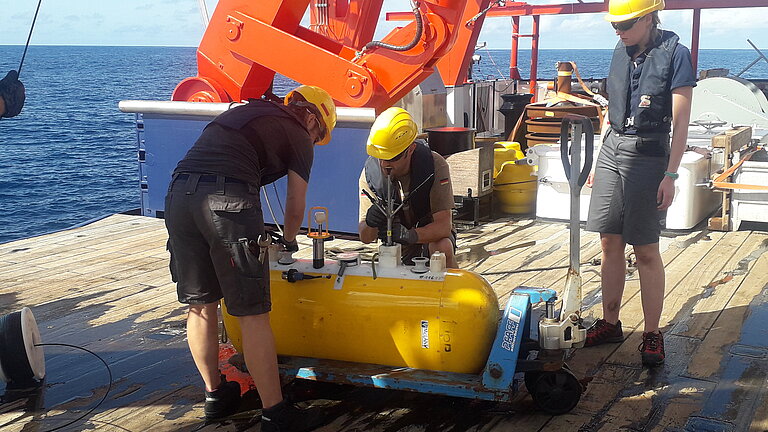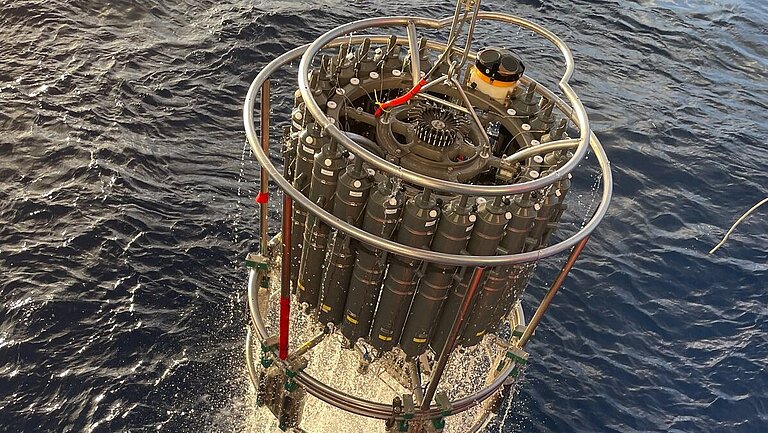Long-term measurements for climate research
“WARD Tropics” Expedition studies ocean currents in the tropical Atlantic
Led by Dr Rebecca Hummels, physical oceanographer at the GEOMAR Helmholtz Centre for Ocean Research Kiel, the METEOR expedition M207 “WARD Tropics” started this weekend. The five-and-a-half-week research cruise spans the tropical Atlantic, investigating oceanic and atmospheric processes.
The title of the expedition, WARD, summarises its three main research topics: the Western Boundary Circulation, the Atlantic Meridional Overturning Circulation (AMOC), and Rain and Dust in the Tropical Atlantic.
Focus on ocean currents
A key focus of the expedition will be the western boundary circulation off South America, in particular the North Brazil Undercurrent (NBUC), which plays a key role in the Atlantic Meridional Overturning Circulation. The team will maintain and deploy deep-sea moorings along the Brazilian coast and at the equator, continuing a decade-long data series.
“These long-term data are extremely valuable,” says Rebecca Hummels. “The AMOC is a critical factor in global climate regulation. It transports significant amounts of heat and nutrients within the ocean. Any changes in this circulation could have a profound impact on weather patterns, sea levels, and global carbon uptake”.
Measurements in water and air
To conduct their research, the scientists will use a variety of advanced instruments, including:
- CTD probes to measure salinity, temperature, and depth (pressure), complemented by sensors for oxygen, nutrients, and particle distribution.
- ADCPs (Acoustic Doppler Current Profilers) to measure the speed of ocean currents at different depths.
- Mooring-based instruments, similar to CTD and ADCP systems, with additional sediment traps at the Cabo Verde mooring site to analyse nutrient fluxes in the ocean.
- Radiosondes, launched with balloons to measure temperature, humidity, pressure, and wind at different altitudes.
Contributing to international climate research
The comprehensive measurements will improve understanding of ocean-atmosphere interactions and provide insights into changes within the climate system. Rebecca Hummels emphasises: “The data collected will contribute to a better understanding of oceanic processes and improve long-term predictions of the impacts of climate change on the ocean and atmosphere.”
Follow the expedition in real time
Those interested in tracking the expedition can access real-time research data, such as ocean current velocities here.
Expedition at a Glance:
Name: METEOR Expedition M207 WARD Tropics
Chief Scientist: Dr Rebecca Hummels
Dates: 4 January - 12 February 2025
Start: Belém, Brazil
End: Mindelo, Cabo Verde
Region: Tropical Atlantic
![[Translate to English:] FS METEOR](/fileadmin/_processed_/d/6/csm_METEOR_bc7d5b1c39.jpg)
The research vessel METEOR in the harbour of Belém, Brazil. Photo: David Menzel, GEOMAR

The international research team will use a variety of instruments to study the Western Boundary Current circulation and the Atlantic Meridional Overturning Circulation in the tropical Atlantic. Photo: Lais Baroni Villet

The M207 expedition is collecting valuable data in the tropical Atlantic to better understand the dynamic interactions between the ocean and atmosphere and their impact on global climate. Photo: Lais Baroni Villet

The CTD (Conductivity, Temperature, Depth) rosette is a probe for deep sea surveys. Water samples can be taken simultaneously with the water sampler. Photo: Sunke Schmidtko, GEOMAR


